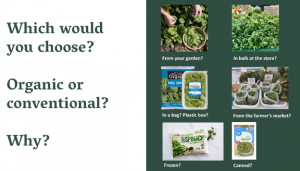Food for Thought – How do we consume our values?
By Ruby Tumber, WEN Board member
Stoutly situated at the bottom of Maslow’s Pyramid of Needs, eating is a basic physiological function. This is news to no one. The irony lies in the fact that for many of us, this most essential function can be fraught with difficulty.
Nearly 12% of the Bay Area is food insecure. How do you get the most caloric output for the least amount of dollars?
Cultural traditions can be a strong influencer in culinary decision-making – how does a lifelong vegetarian break bread with a household of gluten-free paleo enthusiasts?
Many of us are motivated by health and nutrition, some have dietary restrictions or allergies, while others are simply picky.
Our relationship with food is woven with tangled threads of needs and circumstances. Food is also a means by which we can manifest our values on our dinner plate; specifically, our environmental values. This topic was explored on April 7 during a virtual, collective conversation titled “What’s for Dinner? Aligning Your Principles With What’s on Your Plate.”, co-hosted by WEN and led by holistic nutritionist Elaine Westcott.
 During the course of the evening, Elaine navigated participants through culinary conundrums using a sustainably-minded lens. She opened with a simple prompt (or so one thought): if choosing some spinach for your salad – which would you choose? Would it be the one with the smallest footprint, the one grown in your yard? But perhaps you used conventional seed and some less than ideal fertilizer, and the one farmed on a certified organic pasture an hour north (and technically considered “local” as it’s within 90 miles of your residence) is the best choice? But alas, the farmer’s market isn’t until Saturday, so you’re resigned to go to the local grocery store. Do you avoid the giant, corporate mart down the street, or go out of your way to the natural, food co-op? When you’re there, do you limit your single-use plastic supply by getting it loose, frozen, or canned?
During the course of the evening, Elaine navigated participants through culinary conundrums using a sustainably-minded lens. She opened with a simple prompt (or so one thought): if choosing some spinach for your salad – which would you choose? Would it be the one with the smallest footprint, the one grown in your yard? But perhaps you used conventional seed and some less than ideal fertilizer, and the one farmed on a certified organic pasture an hour north (and technically considered “local” as it’s within 90 miles of your residence) is the best choice? But alas, the farmer’s market isn’t until Saturday, so you’re resigned to go to the local grocery store. Do you avoid the giant, corporate mart down the street, or go out of your way to the natural, food co-op? When you’re there, do you limit your single-use plastic supply by getting it loose, frozen, or canned?
Sure, we all aspire to be earth-friendly green goddesses, purchasing the most local, certified-organic, regenerative, and least impactful spinach, but at the end of the day, perhaps all we want is to satiate our stomachs without paranoia, guilt, or judgement.
As participants voiced their perspectives, it became evident there was no clear answer, but rather a very real disparity between what is real and what is ideal. Elaine explained the need to make peace with one’s decision and finding a way to reconcile responsible, environmentally-conscious consumption with simply filling one’s belly. Informing oneself on regional environmental issues, food streams, and food marketing can all aid in informing better decisions.
Elaine went on to explain that though society places a value on certain diets and behaviors, the environmental issues behind them can be quite complicated. Perhaps it’s a misnomer to think that a vegan diet is environmentally less impactful than one with animal products. This thinking can be undermined if the diet is composed entirely of processed proteins and GMO soy products, which could be less nutritious or environmentally sound than meat from a cow raised on a regenerative farm.
The issues are clearly nuanced, ergo, reinforcing the requisite to stay informed as a consumer, and going beyond simply knowing where your food comes from. This means detangling marketing ploys and greenwashing techniques, and understanding the differences between USDA certifications (fun fact, not all labels are regulated!). It could also mean understanding what type of consumer you are. Elaine outlined the 5 types of consumers on a “spectrum of sustainability”
- Practical Shopper: someone unfamiliar with sustainability issues and likely needs more information on food systems
- Passive Buyer: someone who gravitates to whatever pleases them, not necessarily considering nutrition or sustainability
- Health Conscious Eater: someone versed and interested in sustainability matters, but more motivated by health and nutrition
- Curated Diner: someone driven more on the human aspect of sustainability (e.g. environmental justice, fair labor, sourcing)
- Karmic Naturalist: someone passionate and strongly swayed by sustainability and environmental practices.
Knowing where you fall under what circumstance and what you identify with can help you understand where your knowledge can be expanded.
At the end of the day, Elaine provided a judgement free seat at the table, encouraging self-compassion while gaining clarity on one’s own values and garnering empathy for those whose dinner plate differs from your own. The intersection of sustainability and nutrition is complicated. But, giving ourselves information and empathy to explore can make the decision-making a whole lot more palatable.
Special note: Elaine Westcott can be found at https://www.elainewestcott.com/. She is specialized in providing tools for period-having individuals to navigate their cycles through a nutritionist perspective.
Also, shout to all the participants not only for their time, but their contributions. The event was a donation-only event and $111 in proceeds were raised for CUESA, a local organization striving to create a more sustainable food system.
